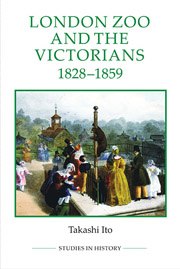Book contents
- Frontmatter
- Contents
- List of figures
- List of tables
- Acknowledgements
- Abbreviations
- Dedication
- Introduction: the zoo in history
- 1 The site of animal spectacle
- 2 Collecting and displaying
- 3 The question of access
- 4 Between science and commerce
- 5 Illusionary empire
- Conclusion: the Darwinian moment
- Appendix
- Bibliography
- Index
4 - Between science and commerce
Published online by Cambridge University Press: 05 April 2014
- Frontmatter
- Contents
- List of figures
- List of tables
- Acknowledgements
- Abbreviations
- Dedication
- Introduction: the zoo in history
- 1 The site of animal spectacle
- 2 Collecting and displaying
- 3 The question of access
- 4 Between science and commerce
- 5 Illusionary empire
- Conclusion: the Darwinian moment
- Appendix
- Bibliography
- Index
Summary
Of all the scientific institutions in Britain the Zoological Society had the largest funds. Charles Babbage remarked in his Reflections on the decline of science in England (1830) that the enormity of the society's income was ‘a frightful consideration’. The society's affluence placed it in a different category from other scientific institutions and also drew public attention to its spending patterns. Whereas most scientific institutions were funded by voluntary subscriptions, the Zoological Society had an additional source of income: receipts from admission to the London Zoo. The potential was clearly identified by William Swainson, naturalist and external critic of the society, who explained its two principal aims in his A preliminary discourse on the study of natural history (1834): promotion of ‘legitimate science’ and provision of ‘popular recreation’. He hoped that the society would unite these spheres:
Where there are ample funds, as in the present case, a judicious management may unite, in equal proportions, popular recreation with the encouragement of legitimate science; for the attraction of the former would raise funds for paying the latter, and thus the highest objects might be combined with those that were more ornamental than useful.
His proposals questioned the public rationale of the Zoological Society, but their importance hardly registered at a time when the society had such confidence in the popularity of the zoo.
- Type
- Chapter
- Information
- London Zoo and the Victorians, 1828-1859 , pp. 107 - 137Publisher: Boydell & BrewerPrint publication year: 2014



